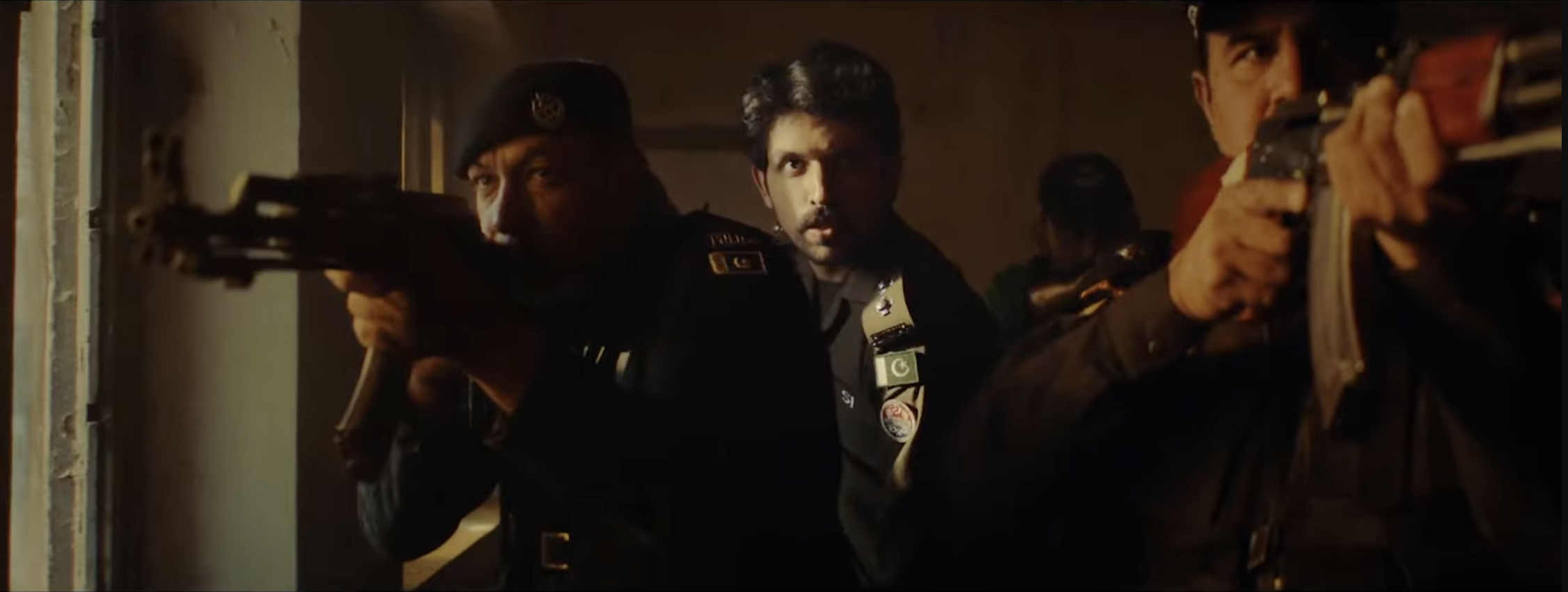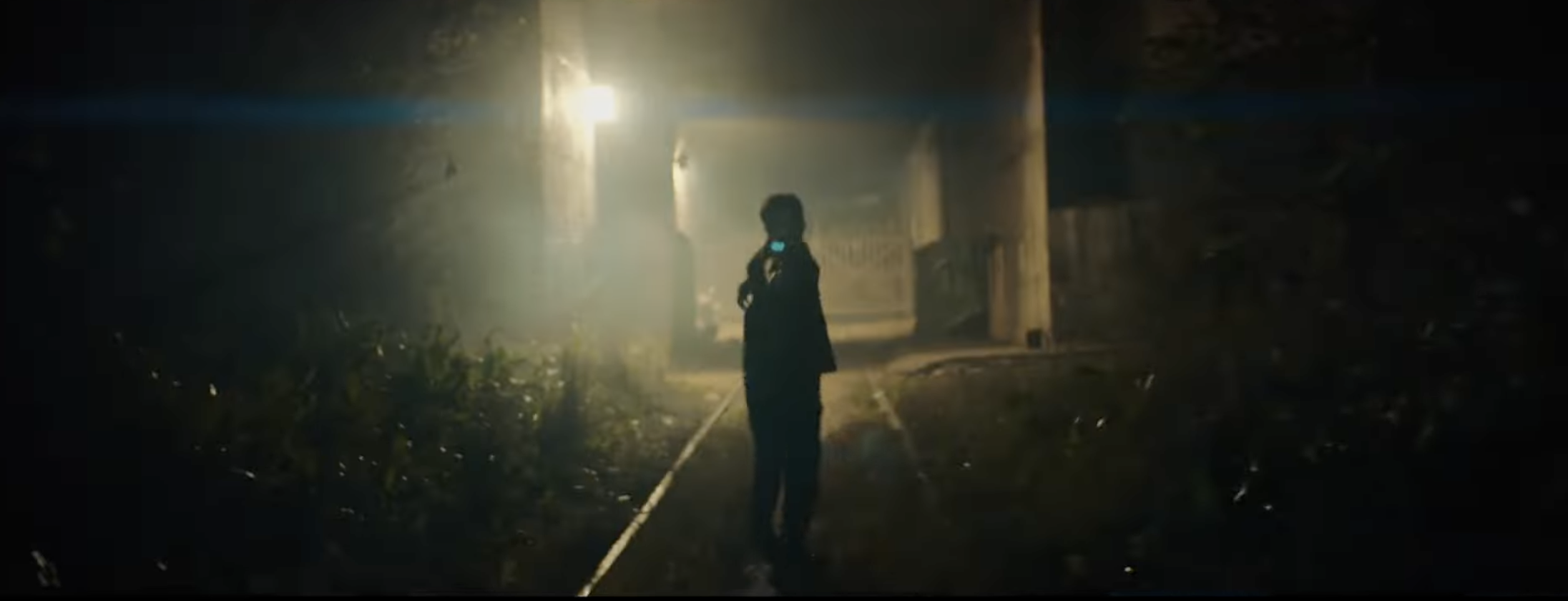Habib Shahzad’s Jujji begins with a quiet kind of darkness, the sort that seeps into a place rather than crashes into it. Rawalpindi is introduced not as a backdrop but as a living pressure system, a city where shadows cling to the edges of buildings and linger in the pauses between a detective’s footsteps. Much like the best modern crime dramas, the film isn’t really concerned with the killer’s identity so much as the emotional residue he leaves behind. Shahzad shows us the murderer early on, almost challenging the audience to stop searching for a twist and start noticing the people who have to absorb the impact of his violence.
That shift in focus gives Jujji a surprisingly intimate shape. At just over seventy minutes, the film feels like a collection of private pages from someone’s notebook, shared reluctantly. Its momentum comes not from plot turns but from the slow, steady erosion of the officers at its center.
The anchor is SI Naveed, played with a wounded restraint by Mustafa Rizvi. He is a man upright in posture yet bent internally by a past he can’t shed. His ambition is clear; he wants the kind of progress that justifies years of sacrifice. But there’s a painful honesty in how the very discipline defining him becomes the wedge in his own home. The scenes with his wife and daughter ache with unresolved tenderness. Nothing dramatic happens, but the space between them feels like the aftermath of an emotional crime. The film’s quiet confidence shows in how it lets silence do the storytelling.
Constable Arshad offers a counterweight. Anjum Habibi brings a warmth shaped by hard experience. His small smiles and offhand remarks feel like the armor of someone who has learned that despair is a choice, and not one he is willing to make. The dynamic between Naveed and Arshad isn’t flashy, and it doesn’t rely on typical buddy-cop rhythms. Instead, their tension stems from recognisable human friction: the idealist struggling to uphold the meaning of justice and the pragmatist who has lived long enough to know justice doesn’t always return the favor. Their partnership hints at deeper parallels the film only touches briefly, and this is one area where Jujji could have gone further. Arshad’s hinted-backstory feels rich, and exploring it more would have made their connection even stronger.
The killer, played by Arslan, hovers on the edge of menace and invisibility. He moves like someone accustomed to being overlooked, shaped by neglect more than ideology. The film gives him a peculiar, almost clinical interest in anatomy, yet stops short of fully digging into his psyche. This may be an intentional choice, emphasizing the systems that create such figures rather than the individuals themselves. Still, a bit more insight could have added dimension to an otherwise haunting performance.
Visually, Jujji stands out. Furqan Gul’s cinematography is patient, observant, and beautifully restrained. Rawalpindi appears stripped of glamour, its sodium-lit streets and dim corridors rendered with a muted honesty that feels lived in. The long takes have a watchful quality, as if the camera is recording rather than interpreting. The score by Alister Alvin and Zahra Paracha drifts through scenes like an unsettled feeling you notice before you understand it, enhancing tension without overwhelming it.
Where the film finds real power is in its portrait of emotional burden. Naveed’s pursuit of the killer becomes less about the case and more about repairing something fractured inside himself. The true story inspiring the film, particularly his earlier failure to save a kidnapped girl, lingers in every decision he makes. Shahzad avoids melodrama and instead charts how guilt hardens into discipline, and how discipline can become its own prison. The procedural elements are handled with refreshing restraint. Interviews, false starts, small breakthroughs, and hesitant teamwork all feel authentic. There are no shortcuts, no convenient revelations. This realism keeps the stakes grounded and lends moral weight to the final act.
If the film has one limitation, it lies in how much it withholds. Its minimalism is one of its strengths, but occasionally it leaves emotional threads slightly underdeveloped. There are moments where leaning a bit more into character histories, particularly Arshad’s and the killer’s, could have enriched the already strong themes.
Even so, Jujji is remarkably assured. It resists spectacle in favor of honesty and presents crime not as entertainment but as a drain on the human spirit. Pakistani cinema has been steadily expanding its reach, and Jujji feels like a confident step onto a wider global stage. It is modest in scale, restrained in style, and deeply sincere in its interrogation of justice, exhaustion, and redemption.
In the end, the film lingers because it asks something simple but heavy: what does justice mean to a man who has already judged himself? Jujji doesn’t offer a definitive answer, but it gives us a story worth sitting with, and a lead character whose quiet moral struggle resonates long after the credits.
It is a striking, thoughtful work that deserves attention, both for what it accomplishes and for the promise it signals in Pakistani filmmaking.
Jessie Hobson



